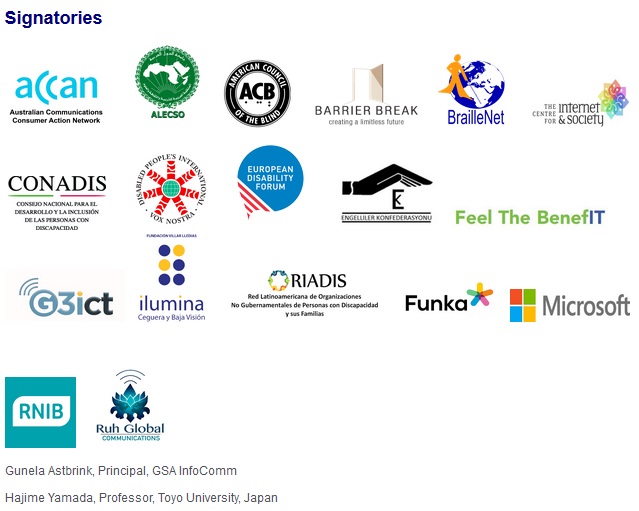Global Charter: Promoting Global Digital Inclusion through ICT Procurement Policies & Accessibility Standards
The Centre for Internet & Society was a signatory to this initiative.
This was published by G3ict.
Foreword
G3ict, the Global Initiative for Inclusive Information and Communications Technologies (“ICTs”), whose mission is to promote the full implementation of the dispositions of the Convention on the Rights of Persons with Disabilities ("CRPD”) relative to the accessibility of ICTs,
- Considering that Accessibility, Equal Opportunity and Non-Discrimination are among the fundamental principles of the CRPD, the realization of which in the digital age is conditioned by the availability of accessible ICTs,
- Taking into account that the CRPD specifically recognizes the accessibility of information and communication technologies (ICTs) both as a right (Article 9) and as an enabler of other human rights as prescribed in other articles of the Convention.
- Noting that its articles 4(a) to 4(d) under "General obligations" further require that States Parties adopt appropriate legislative, administrative and other measures to ensure these rights are met and to refrain from any act or practice that is inconsistent with the Convention and that public authorities and institutions are in particular required to act in conformity with the Convention.
- Acknowledging that the procurement of ICTs for use by the public that are not usable and accessible by persons with disabilities may be deemed to be in contravention of the Convention.
- Recalling that Reporting Guidelines to States Parties should include legislative and other measures taken to ensure access by persons with disabilities, on an equal basis with others, to the physical environment, to transportation and to information and communications; technical standards and guidelines for accessibility, as well as the use of public procurement provisions and other measures that establish compulsory accessibility requirements.
Offers the attached charter for signature by leaders of Civil Society, International Organizations and the Private Sector to further the progress and momentum of international cooperation in establishing public procurement policies and standards in compliance with the CRPD.
Charter
We believe that governments should use their purchasing power to support the innovation of accessible technology and the creation of more robust accessible technology markets in every country.
We encourage governments at all levels and around the world to promote the digital inclusion of persons with disabilities and older persons by adopting effective policies for the public procurement of accessible ICT and an international accessibility standard to support them.
Public Procurement as an Inclusion Strategy
Public procurement processes have gained increased attention as an effective policy tool to promote the accessibility of information and communications (ICT) equipment, software, applications, and services purchased by governments or government-funded programs. Global interest in the positive effect of public procurement is in part the result two well-known accessibility public policy activities; Section 508 of the Rehabilitation Act in the United States (governing the federal government purchase of accessible electronic and information technology) and in Europe, the Public Procurement Directive of 2014 in combination with EN 301 549 (the European accessibility standard developed to support the public procurement of accessible ICT products and services in Europe). However, G3ict research and analysis show that to date only 33% of States Parties to the United Nations Convention on the Rights of Persons with Disabilities (CRPD) have enacted some type of policy on the procurement of accessible ICT.
Everyone Benefits from the Procurement of Accessible ICT
Public procurement of accessible ICT can advance equality and non-discrimination for persons with disabilities. Governments that purchase accessible ICT are better able to provide inclusive services to all citizens. Because governments are large employers, their investments in accessible ICT products and services help to create inclusive workplaces and support the employment of people with disabilities. Procurement policies strengthen the local technology industry in a country. They lead to greater innovation, competition, and choice for accessible technology. They drive the creation of new development tools for accessible technology and better accessibility training for technology professionals. Procurement policies create positive ripple effects into the broader consumer ICT marketplace.
The Tools Available for Success
G3ict, working with the International Telecommunication Union (ITU) and with global experts from civil society and industry has created a model procurement policy as resource for governments wanting to ensure that their technology purchases support digital inclusion. There exists today a comprehensive technical standard, EN 301 549, that was developed by experts specifically for public procurement. It defines accessibility across all types of disability and technology. The ITU has created a training course to support procurement officials as they implement accessibility into their procurement work.


